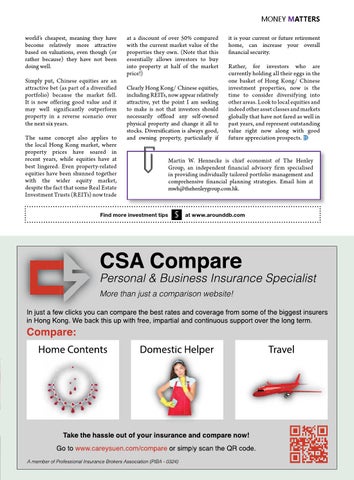MONEY MATTERS world’s cheapest, meaning they have become relatively more attractive based on valuations, even though (or rather because) they have not been doing well. Simply put, Chinese equities are an attractive bet (as part of a diversified portfolio) because the market fell. It is now offering good value and it may well significantly outperform property in a reverse scenario over the next six years. The same concept also applies to the local Hong Kong market, where property prices have soared in recent years, while equities have at best lingered. Even property-related equities have been shunned together with the wider equity market, despite the fact that some Real Estate Investment Trusts (REITs) now trade
at a discount of over 50% compared with the current market value of the properties they own. (Note that this essentially allows investors to buy into property at half of the market price!) Clearly Hong Kong/ Chinese equities, including REITs, now appear relatively attractive, yet the point I am seeking to make is not that investors should necessarily offload any self-owned physical property and change it all to stocks. Diversification is always good, and owning property, particularly if
Find more investment tips
it is your current or future retirement home, can increase your overall financial security. Rather, for investors who are currently holding all their eggs in the one basket of Hong Kong/ Chinese investment properties, now is the time to consider diversifying into other areas. Look to local equities and indeed other asset classes and markets globally that have not fared as well in past years, and represent outstanding value right now along with good future appreciation prospects.
Martin W. Hennecke is chief economist of The Henley Group, an independent financial advisory firm specialised in providing individually tailored portfolio management and comprehensive financial planning strategies. Email him at mwh@thehenleygroup.com.hk.
at www.arounddb.com
ď‚„ January 2014
47
